Coronavirus Today: Is Biden too bullish on booster shots?
- Share via
Good evening. I’m Karen Kaplan, and it’s Friday, Aug. 20. Here’s the latest on what’s happening with the coronavirus in California and beyond.
There’s some real cognitive dissonance going on regarding COVID-19 vaccines. On the one hand, nearly 40% of Americans have yet to receive their first dose. On the other hand, the Biden administration is making plans to deliver booster shots to those who are already fully vaccinated.
There’s no question it’s becoming more common to see “breakthrough” infections in people who’ve been immunized. Is that happening because the protection from vaccines is wearing off? Or is it because the Delta variant now accounts for an estimated 98.8% of all coronavirus cases in the U.S., and it replicates so fast that infections take root while the body’s immune system is still getting into gear?
The answer matters. If the characteristics of Delta are to blame, then vaccine boosters may not do much to change that.
When they announced their intention to begin offering COVID-19 boosters during the week of Sept. 20, federal health officials did not make a clear-cut case that a third dose of the Pfizer-BioNTech or Moderna vaccine would make breakthrough infections less likely.
“We are concerned that the current strong protection against severe infection, hospitalization and death could decrease in the months ahead, especially among those who are at higher risk or who were vaccinated earlier,” Dr. Rochelle Walensky, director of the Centers for Disease Control and Prevention, said Wednesday. “Our plan is to protect the American people and to stay ahead of this virus.”
To Shane Crotty, a vaccine researcher at the La Jolla Institute for Immunology, that sounds like “a better-safe-than-sorry kind of decision.”
“Are boosters required, or critically needed?” he asked. “I don’t think the data support that.”
The CDC published three new reports Wednesday that showed infections among vaccinated people were rising in tandem with the Delta variant’s prevalence in the U.S. But there was no accompanying decline in the vaccines’ power to avert hospitalizations and deaths caused by COVID-19 — something you might expect to see if the vaccines were becoming less effective over time.
Plus, if the vaccines were indeed starting to wearing off, breakthrough cases probably would be rising fastest among those who were vaccinated first — healthcare workers and senior citizens. So far, that doesn’t seem to be the case.
Studies cited this week by Dr. Anthony Fauci, President Biden’s top medical advisor, suggest that antibodies capable of fighting off the coronavirus start to decline about four months after becoming fully vaccinated, and that a booster dose can push those levels back up.
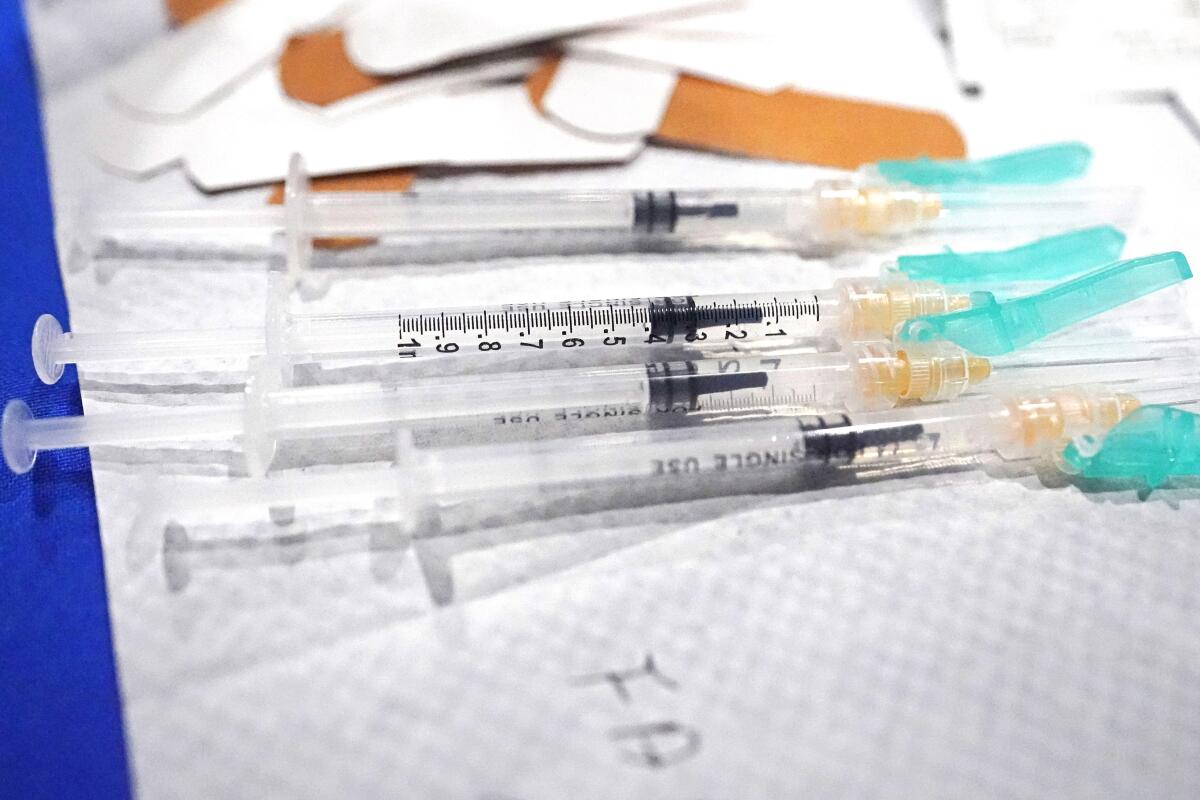
But other scientists said those antibodies weren’t the whole story. They argue that “cell-based immunity” from T cells and B cells can more than make up the slack.
To prevent infections that lead to serious disease, “really all you need is immunological memory, and these vaccines induce immunological memory, and immunological memory tends to be longer-lived,” said Dr. Paul Offit, director of the Vaccine Education Center at Children’s Hospital of Philadelphia.
Offit and others are concerned that the well-intentioned plan for booster shots will wind up scaring people unnecessarily.
“We just sent a message out there that people who consider themselves fully vaccinated were not fully vaccinated,” he said. “And that’s the wrong message, because you are protected against serious illness.”
Jennifer Nuzzo, an epidemiologist at the Johns Hopkins Bloomberg School of Public Health, agreed that the booster shot endorsement will confuse people about the purpose of COVID-19 vaccines.
“They’re not a force field. They don’t repel the virus from your body,” she said. “They train your immune system to respond when you become infected … with the goal of keeping you out of the hospital.”
There are other downsides to moving too quickly. Researchers are still studying the possible side effects of a third dose, though Pfizer and Moderna said their preliminary findings are encouraging.
Many doctors and public health experts say that the country would be better served by working harder to get more first doses into the arms of the 29.6% of Americans who are currently eligible for COVID-19 vaccines but haven’t rolled up their sleeves. Unfortunately, the talk of booster shots may have made that job harder by making them seem less valuable.
There’s also the fact that more than two-thirds of the world’s population is still waiting for a chance to get vaccinated. In low-income countries, only 1.3% of residents have received at least one dose, according to Our World in Data.
Unvaccinated people anywhere present a threat to people everywhere. Any time you lose sight of this fact, just remember that the Delta variant emerged in India.
“There’s NOT just a humanitarian or ethical argument for holding off on giving the vaccinated extra vaccine doses,” Dr. Celine Gounder, an infectious disease expert at Bellevue Hospital in New York City, wrote on Twitter this week. “This is in OUR SELF-INTEREST. Vaccinating the unvaccinated here & around the world WILL PROTECT US BETTER.”
By the numbers
California cases, deaths and vaccinations as of 5:57 p.m. Friday:

Track California’s coronavirus spread and vaccination efforts — including the latest numbers and how they break down — with our graphics.
A frustrated doctor’s heartfelt plea
No story on our site has garnered more attention this week than an essay by Dr. Anita Sircar. She’s an infectious disease physician and clinical instructor of health sciences at the UCLA School of Medicine.
More to the point, she’s been working on her hospital’s COVID-19 unit for more than 17 months — and she has a message for you:
“The most effective thing you can do to protect yourself, your loved ones and the world, is to GET VACCINATED,” she writes.
This is hardly a new idea. (This isn’t even the first time you’ve heard this in the newsletter you’re reading right now.) So why has her essay been read more than 2 million times since Tuesday? I suspect it’s because she puts the stakes for getting vaccinated in terms that are easy to understand.
She focuses on an unnamed patient who came into her hospital 10 days after he tested positive for a coronavirus infection. At first blush, he didn’t fit the profile of a person who’d be particularly vulnerable to COVID-19 — he was under 50 and in good health except for having mildly high blood pressure.
But there was something that put him in the coronavirus’ crosshairs: He wasn’t vaccinated.
Sircar asked the patient why he’d made that decision. His reply was one we’ve all heard before.
“Well, I’m not an anti-vaxxer or anything. I was just waiting for the FDA to approve the vaccine first. I didn’t want to take anything experimental. I didn’t want to be the government’s guinea pig, and I don’t trust that it’s safe,” the patient said.
Yet when his symptoms got worse, he put his faith in some hydroxychloroquine he bought online — even though the FDA revoked its emergency use authorization for the drug more than a year ago.
He was also treated with remdesivir and monoclonal antibodies — two options that have been endorsed by the FDA. But as Sircar pointed out to the patient, they were tested in far fewer people than the COVID-19 vaccines, which have been administered more than 360 million times in the U.S. and more than 4.7 billion times around the world.
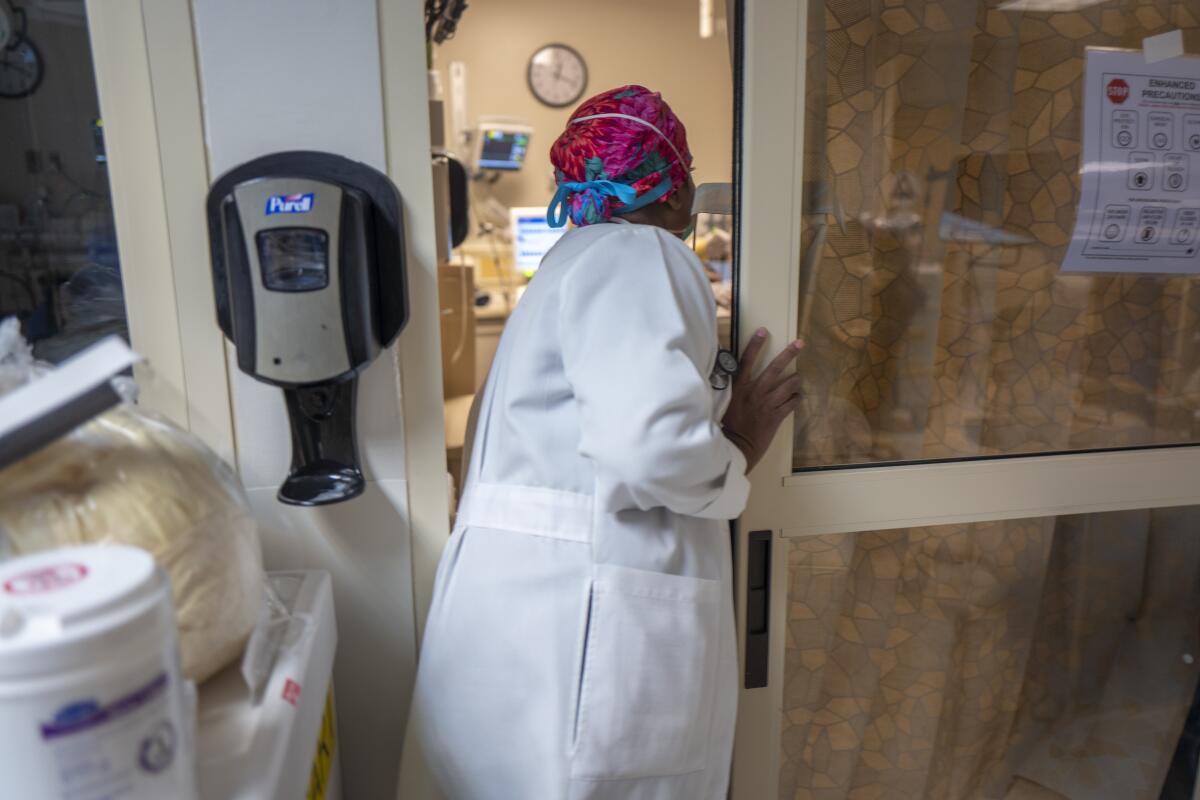
Spoiler alert: None of it worked. The patient died.
“Last year, a case like this would have flattened me,” Sircar wrote. “This year, I struggled to find sympathy. ... This tragedy, this unnecessary, entirely preventable loss, was on him.”
And it wasn’t just her. The whole care team coped by reminding themselves that they did everything they could for their patient, but he was the one who opted not to protect himself and his family by getting vaccinated. (His unvaccinated wife also came down with COVID-19, as did the couple’s two young children.)
Don’t end up like this patient, Sircar pleads.
She runs through a list of excuses to avoid vaccination — The pandemic is almost over. If I get sick I’ll just go to the hospital. I can’t get vaccinated because I’m pregnant. The vaccine is too risky for my teenage kids. — and demolishes them all.
“If you believe I’ll just let everyone else get vaccinated around me so I don’t have to, there are 93 million eligible, unvaccinated people in the ‘herd’ who think the same way you do,” she writes. Until they change their minds, they are “getting in the way” of ending this pandemic.
Do yourself a favor and read the whole essay. You won’t regret it.
California’s vaccination progress
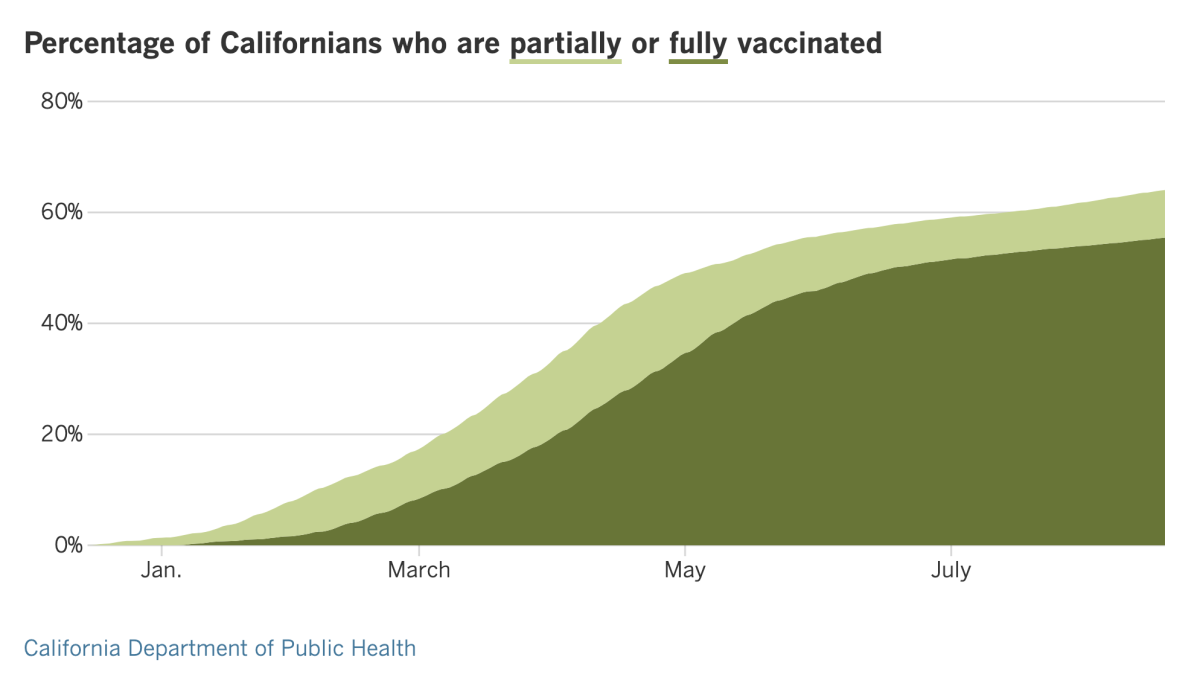
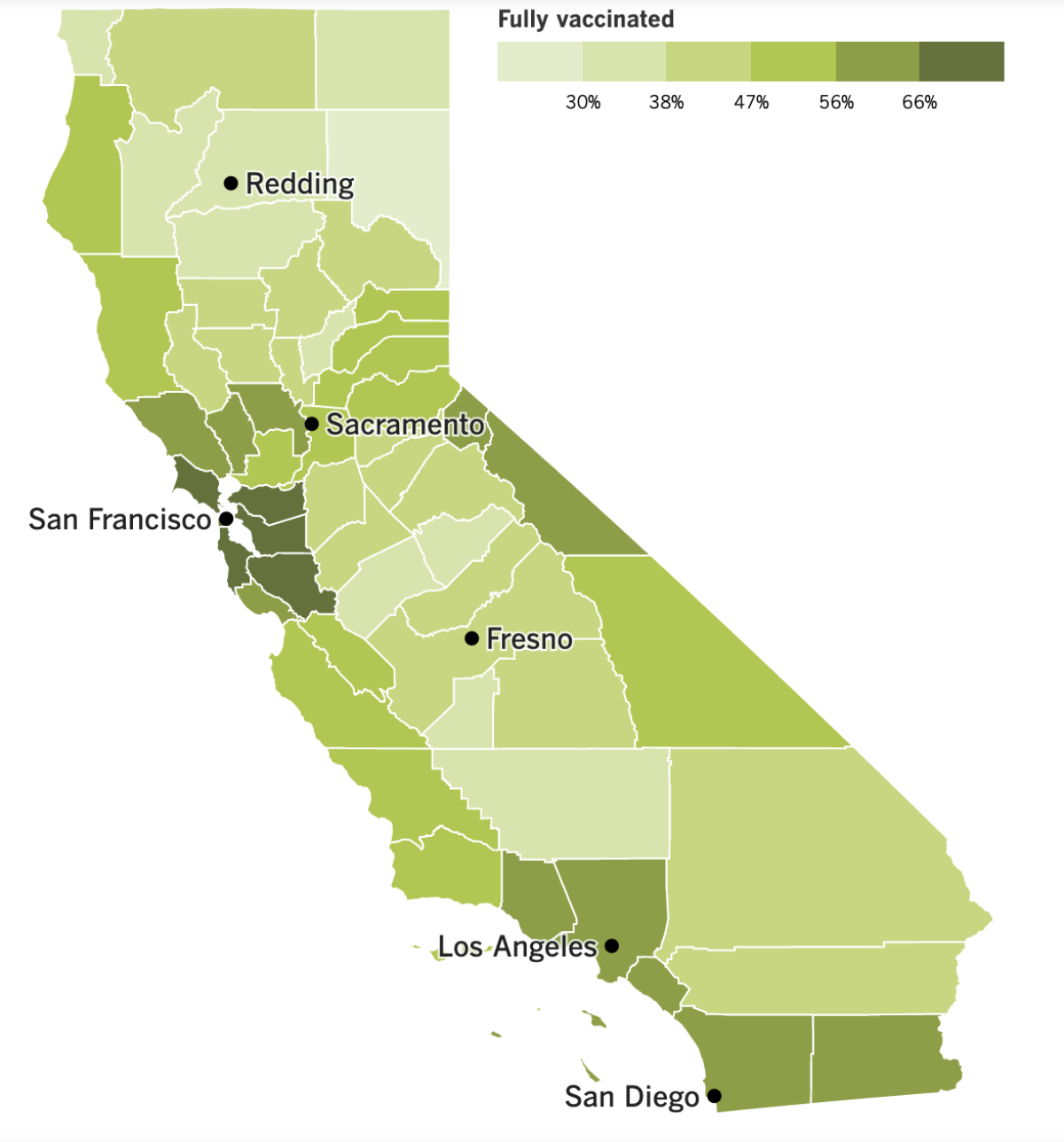
See the latest on California’s vaccination progress with our tracker.
Consider subscribing to the Los Angeles Times
Your support helps us deliver the news that matters most. Become a subscriber.
In other news ...
So much for the idea that a return to normal life is just around the corner. Thanks to the Delta variant, we’re instead looking at more mask mandates and tougher vaccine requirements in the months ahead.
Those probably aren’t the only steps we’ll need to take to get the Delta surge under control. More aggressive testing and perhaps a return to distance learning may be in our future too.
“There will be a time when we have our masks off again as transmission goes back down,” said UC San Francisco epidemiologist Dr. Kirsten Bibbins-Domingo. But, she said, “I don’t think we’re going to be totally throwing our masks away anytime soon.”
As of today, Los Angeles County requires masks or other face coverings for everyone — vaccinated or not — attending concerts, sports games or other large outdoor events with more than 10,000 attendees. Masks can only be removed “briefly to eat or drink,” then must be put back in place “immediately,” according to the county’s updated health order.
The policy was prompted by the fact that Delta has fueled sharp rises in cases and hospitalizations over the last two months. In fact, the county crossed a grim milestone on Thursday, recording its 25,000th COVID-19 death since the start of the pandemic.
The state of California has updated its rules for large indoor gatherings. Starting Sept. 20, organizers of indoor events with at least 1,000 people will have to verify that everyone has either been vaccinated or tested negative for a coronavirus infection within the prior 72 hours. Such rules are already in place for indoor events with crowds of at least 5,000.
Officials in San Francisco aren’t kidding around with their first-in-the-nation vaccine mandate. The city informed 17 employees of the police, fire and sheriff’s departments that they face 10-day suspensions without pay for missing an Aug. 12 deadline to disclose their vaccination status.
The employees were notified via letter this week, and hundreds of additional foot-draggers may get letters next week.
“The health and well-being of city employees and the public we serve are top priorities during our emergency response to COVID-19,” officials said in the letter, which was obtained by the San Francisco Chronicle. “Your failure to comply with the vaccination status reporting requirement endangers the health and safety of the city’s workforce and the public we serve.”
Almost all of the city’s 36,000 employees met the deadline, and about 90% of them were already vaccinated. But nearly 200 workers have complained that the mandate infringes on their religious and constitutional rights. Some Sheriff’s Department employees have said they’d rather retire or quit than get the vaccine, and at least one firefighter has filed a lawsuit challenging the policy.
Meanwhile, people with weakened immune systems who already received two doses of the Pfizer-BioNTech or Moderna vaccines can now get a booster shot in L.A. County if they’d like one. The third doses are available at vaccination sites that have Pfizer and/or Moderna shots on hand.
Patients are asked to check with their healthcare providers to confirm that they’re eligible before they seek a booster. (We list the criteria here.)
County officials are asking residents who qualify for a third dose to speak to their healthcare provider to confirm their eligibility and get vaccinated. Third doses of the vaccines are accessible through vaccination sites that currently offer Pfizer or Moderna vaccines. Ideally, patients should get the same vaccine they received before, but switching is allowed if necessary.
In national vaccine news, the FDA is poised to give full, official approval to the Pfizer-BioNTech vaccine early next week. An official who spoke on condition of anonymity said the approval would probably come Monday or Tuesday.
Biden has called for the FDA to grant full approval to the vaccine, hoping it will ease doubts about its safety and make it easier for schools, companies and others to enforce vaccine mandates.
Texas Gov. Greg Abbott has issued a preemptive ban on mask mandates, but the state’s Supreme Court on Thursday declined to block a restraining order against the ban. That same day, the Texas Education Agency stopped enforcement of the ban.
Indeed, seven counties and 48 school districts have implemented mask mandates in spite of Abbott’s ban. Millions of students in mostly Democratic areas of Texas, Florida and Arizona are not required to wear masks in school.
Your questions answered
Today’s question comes from readers who want to know: Do I need a booster shot if I got the Johnson & Johnson vaccine?
We’ve previously heard from folks who got J&J’s COVID-19 vaccine and wondered if they’d benefit from a dose or two of the vaccines made by Pfizer-BioNTech or Moderna. Both times we’ve considered this question, the answer has been no.
So you may not be surprised to learn that health officials still aren’t recommending booster shots for J&J recipients.
The question has come up again, of course, because the Biden administration plans to start offering booster shots next month to people who have already had two doses of the Pfizer or Moderna vaccines. All adults who received either of those vaccines will be eligible, but only once eight months have passed since their second dose.
Considering that the first Johnson & Johnson shots were administered in March, it will take until November for recipients to hit the eight-month mark.
Besides, the J&J vaccine is still doing a good job of reducing the risk of a serious or fatal case of COVID-19, even when challenged by the Delta variant.
“I don’t think there’s any signal that the J&J vaccine is failing at its primary task,” said Dr. Amesh Adalja, an infectious disease specialist at the Johns Hopkins Bloomberg School of Public Health.
But federal health officials don’t expect that performance to last forever. Both Fauci and U.S. Surgeon General Vivek Murthy have indicated that J&J boosters will be needed at some point.
Johnson & Johnson is already studying the possible benefits of a second dose of its shot. Government scientists expect to have more data to review in the coming weeks.
We want to hear from you. Email us your coronavirus questions, and we’ll do our best to answer them. Wondering if your question’s already been answered? Check out our archive here.
The pandemic in pictures
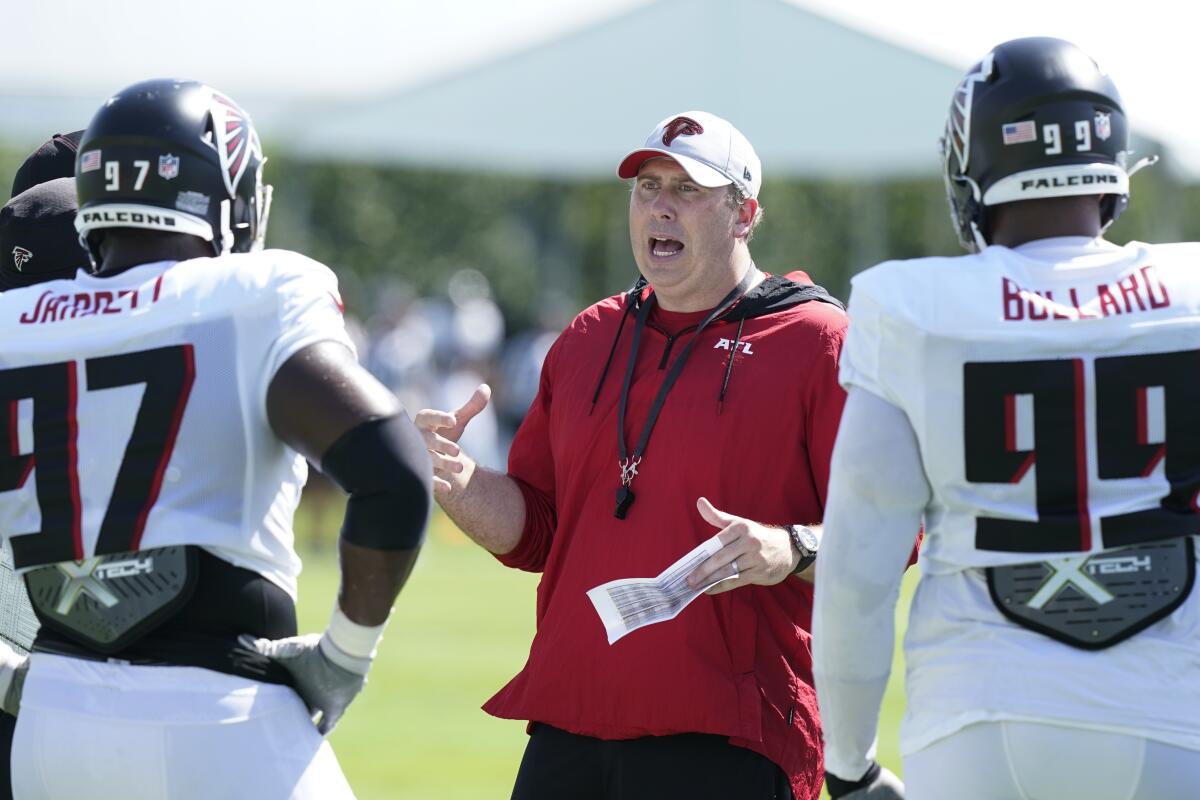
The Atlanta Falcons will play a preseason game against the Miami Dolphins tomorrow, and I’ll be rooting for the Falcons.
They won me over by becoming the first team in the National Football League to achieve a 100% vaccination rate among its players. Not only that, they bragged about it.
COVID-19 vaccinations are up across the entire league, thanks to some persuasion (coercion?) by NFL leadership. After warning teams on July 22 that they’d have to take a loss on games that had to be canceled as a result of coronavirus outbreaks among their unvaccinated players — and that they’d be “responsible for all additional expenses incurred by the opposing team” — the shots suddenly became a lot more popular.
By Aug. 11, more than 90% of all players had received at least one dose of COVID-19 vaccine, and 15 of the league’s 32 players had a vaccination rate above 95%.
The kinds of peer pressure that worked for the NFL can’t be easily translated to the country at large, my colleague Michael Hiltzik writes. But the league’s strong endorsement of vaccines sends a clear message to fans — especially those who have yet to roll up their sleeves.
Resources
Need a vaccine? Sign up for email updates, and make an appointment where you live: City of Los Angeles | Los Angeles County | Kern County | Orange County | Riverside County | San Bernardino County | San Diego County | San Luis Obispo County | Santa Barbara County | Ventura County
Need more vaccine help? Talk to your healthcare provider. Call the state’s COVID-19 hotline at (833) 422-4255. And consult our county-by-county guides to getting vaccinated.
Practice social distancing using these tips, and wear a mask or two.
Watch for symptoms such as fever, cough, shortness of breath, chills, shaking with chills, muscle pain, headache, sore throat and loss of taste or smell. Here’s what to look for and when.
Need to get tested? Here’s where you can in L.A. County and around California.
Americans are hurting in many ways. We have advice for helping kids cope, resources for people experiencing domestic abuse and a newsletter to help you make ends meet.
We’ve answered hundreds of readers’ questions. Explore them in our archive here.
For our most up-to-date coverage, visit our homepage and our Health section, get our breaking news alerts, and follow us on Twitter and Instagram.




